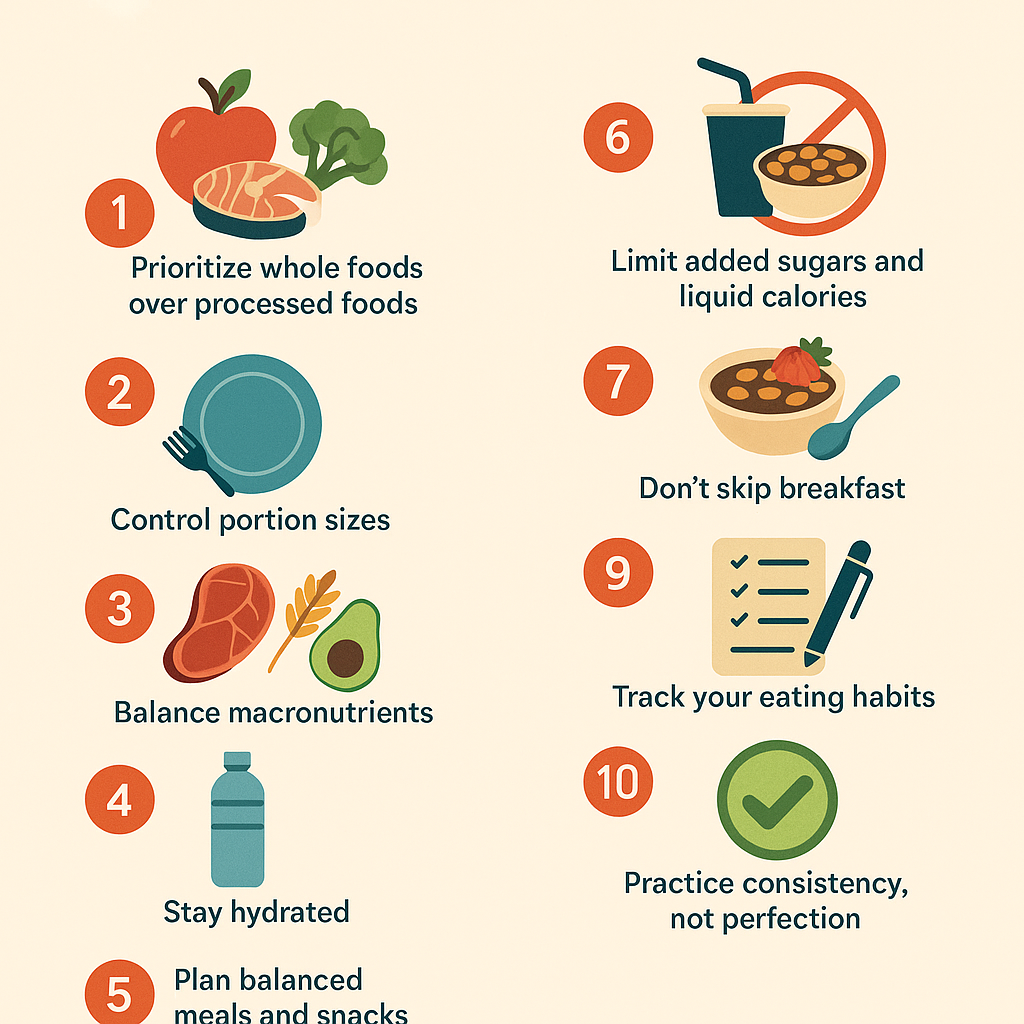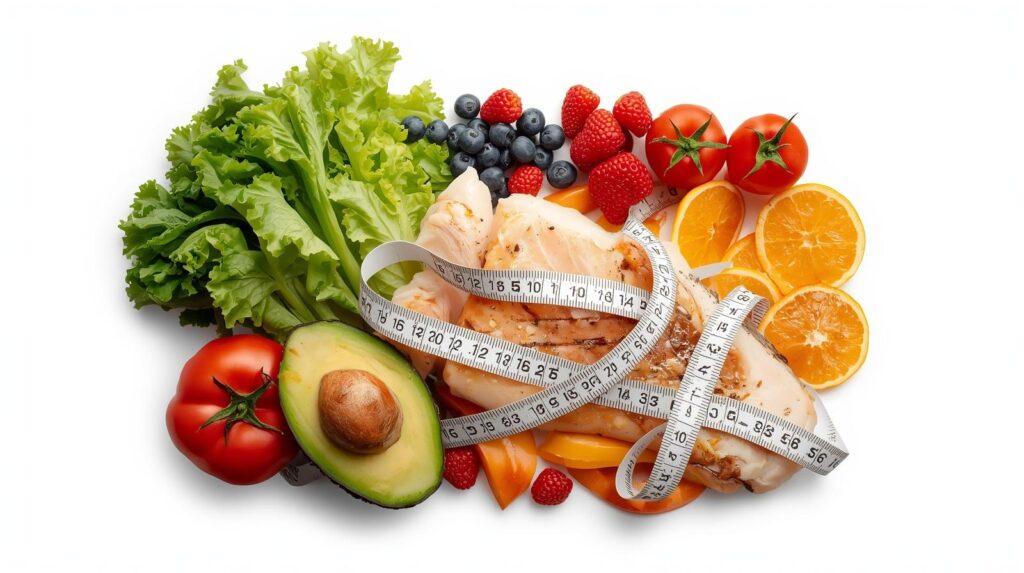Practical strategies you can use today—without crash diets.

Introduction
Weight loss is a common goal for million nis of people, but most struggle with one big question: how do you lose weight quickly without risking your health and while making sure the results last? The truth is that many people attempt rapid weight loss through extreme diets, fasting, or quick fixes, but these approaches rarely last. Instead of looking for shortcuts, the smarter strategy is to focus on fast and sustainable weight loss.
But what does sustainable weight loss mean? It is the process of reducing body weight at a pace that your body can handle safely and maintaining that weight loss in the long term. This approach prioritizes healthy eating, realistic nutrition tips, and lifestyle adjustments rather than relying on temporary crash diets. In this guide, you will discover ten proven nutrition tips for weight loss that actually work, are backed by science, and can be applied in daily life.
Understanding Sustainable Weight Loss
Before we dive into the tips, it is important to answer some questions many people ask:
- What is sustainable weight loss? It is the ability to lose weight gradually and keep it off long term by building healthy eating habits and realistic routines.
- Is rapid weight loss sustainable? Most of the time, the answer is no. Quick results from extreme diets usually disappear once you return to normal eating patterns.
- How much weight loss is sustainable? Experts agree that losing one to two pounds per week is safe and effective. Faster results may look exciting but are difficult to maintain.
By understanding these basics, you can see why the focus should be on nutrition tips that bring real, lasting results rather than short bursts of weight loss that end in disappointment.
1. Prioritize Whole Foods Over Processed Foods
One of the best nutrition tips for weight loss is to fill your plate with whole, natural foods. Whole foods include fresh fruits, vegetables, lean proteins, nuts, seeds, and whole grains. These foods provide your body with essential nutrients, fiber, and energy while keeping calorie intake under control.
Processed foods, on the other hand, are usually high in sugar, salt, and unhealthy fats. They often provide empty calories that do not satisfy hunger for long. Swapping fast food, packaged snacks, and sugary treats for whole foods is one of the simplest ways to achieve fast and sustainable weight loss.
2. Control Portion Sizes
Even healthy foods can contribute to weight gain if portion sizes are too large. Portion control is one of the most practical nutrition advice for weight loss. You do not have to count every calorie, but you should be mindful of how much you are eating.
Simple tricks include using smaller plates, dividing your plate into sections for protein, vegetables, and grains, and stopping when you are about 80 percent full. Paying attention to portion sizes helps prevent overeating and makes it easier to track progress over time.
3. Balance Macronutrients for Long-Term Results
Macronutrients are proteins, carbohydrates, and fats. Balancing them is key to sustainable fat loss. Protein is especially important because it keeps you full longer and supports muscle maintenance during weight loss. Carbohydrates provide energy but should mostly come from complex sources like brown rice, oats, and sweet potatoes. Healthy fats from sources such as avocados, nuts, and olive oil are essential for hormone balance.
If you ignore balance and focus only on cutting calories, you may lose weight quickly but feel tired, weak, and unsatisfied. That is why focusing on nutrition tips for fat loss that include macronutrient balance ensures better long-term success.
4. Stay Hydrated
Water plays a powerful role in weight management. Drinking water before meals helps control appetite, and staying hydrated improves digestion and metabolism. Sometimes the body confuses thirst with hunger, leading to unnecessary snacking.
Aim for at least 8 glasses of water per day, and increase intake if you are active or live in a hot climate. Replacing sugary drinks with plain water or herbal tea is an easy way to cut extra calories and support healthy weight loss.
5. Plan Balanced Meals and Snacks
Planning your meals ahead of time is a proven strategy for sustainable weight loss. When you plan, you are less likely to grab unhealthy snacks or order fast food. Meal planning ensures that you have balanced options available that align with your goals.
For example, a balanced meal may include grilled chicken with quinoa and a side of vegetables. A healthy snack could be a small portion of nuts with a piece of fruit. These nutrition ideas for weight loss keep your energy levels steady and prevent binge eating.
If you need help planning, you can use tools like NutriFitCalc which makes it easier to create meal plans tailored to your weight loss journey.
6. Limit Added Sugars and Liquid Calories
One of the most effective nutrition help for weight loss is reducing sugar intake. Added sugars are hidden in sodas, fruit juices, flavored coffees, and energy drinks. These liquid calories do not provide satiety but can quickly add up and sabotage weight loss goals.
Instead of sugary drinks, opt for water, black coffee, or unsweetened tea. If you crave sweetness, natural options like fresh fruit or a drizzle of honey on oatmeal can satisfy cravings without overwhelming your calorie intake.
7. Eat More Fiber-Rich Foods
Fiber is one of the most underrated tools for weight loss. Foods rich in fiber, such as beans, lentils, whole grains, vegetables, and fruits, keep you full longer and improve digestion. High-fiber diets are directly linked to reduced risk of obesity, diabetes, and heart disease.
Aiming for at least 25 to 30 grams of fiber per day can support fast and sustainable weight loss. When paired with enough water, fiber helps control appetite naturally without the need for extreme calorie restriction.
8. Do Not Skip Breakfast
Many people skip breakfast thinking it will help reduce calorie intake. In reality, skipping breakfast often leads to overeating later in the day. Starting your morning with a nutritious meal can give you steady energy and improve focus.
Healthy breakfast options include oatmeal topped with berries, eggs with vegetables, or a smoothie made with protein powder, greens, and fruit. These meals provide excellent nutrition help for weight loss by keeping hunger under control throughout the day.
9. Track Your Eating Habits
Tracking what you eat may sound tedious, but it is one of the best nutrition tips for weight loss. When you write down your meals in a journal or use an app, you become more aware of patterns and habits.
Many people underestimate how much they eat. By keeping a record, you can spot areas where you may be consuming extra calories or skipping important nutrients. Tools like NutriFitCalc are also helpful for tracking calories and macros, making the process more effective.
10. Practice Consistency, Not Perfection
The final tip may be the most important. Weight loss is not about being perfect every day. It is about being consistent most of the time. Allow yourself occasional treats, but always return to your healthy eating routine.
Crash diets fail because they are too strict. By following the best nutrition tips for weight loss and maintaining consistency, you build habits that last a lifetime. Remember that long-term success depends on lifestyle changes, not temporary restrictions.
Common Myths About Weight Loss
There are many myths surrounding nutrition. Some people believe that all carbs are bad, while others think fat should be completely avoided. These myths only create confusion.
It is important to understand the difference between weight gain nutrition tips and nutrition tips for fat loss. Weight gain requires calorie surplus and muscle-building strategies, while fat loss requires calorie control and balanced nutrition. Knowing the difference helps avoid mistakes and keeps you focused on the right path.
Learn your baseline needs with the BMR Calculator and estimate activity burn with the Calories Burned Calculator.
Practical Meal and Snack Ideas
To help put these nutrition ideas for weight loss into action, here is a simple example of a day’s meals:
| Meal | Example |
|---|---|
| Breakfast | Oatmeal with almond butter and berries |
| Snack | Greek yogurt with a handful of walnuts |
| Lunch | Grilled chicken salad with olive oil and whole grain bread |
| Snack | Carrot sticks with hummus |
| Dinner | Baked salmon with quinoa and steamed broccoli |
When to Seek Professional Help
Sometimes, even with the best nutrition tips, you may need professional guidance. A registered dietitian can create a personalized plan based on your health conditions, lifestyle, and goals. If you are struggling with cravings, emotional eating, or medical conditions, professional help ensures safe progress.
For extra support in planning meals and tracking your journey, explore NutriFitCalc as a practical companion to your sustainable weight loss success.
Conclusion
Fast and sustainable weight loss is not about starving yourself or following unrealistic diets. It is about building habits that you can maintain for life. By focusing on whole foods, balanced meals, hydration, portion control, and consistency, you can reach your goals without sacrificing health.
Instead of asking is rapid weight loss sustainable, shift your mindset to strategies that help you lose weight gradually and keep it off. Start with small steps, apply these ten proven nutrition tips for weight loss, and celebrate progress along the way.
For extra support in planning meals and tracking your journey, explore NutriFitCalc as a practical companion to your sustainable weight loss success.
Trusted Health Resources
FAQs
About the Author
This article is written by the NutriFitCalc Team, a group of Food Science and Nutrition students who create simple, research-backed guides for healthy living.
We review global health sources like WHO and CDC to keep our content accurate and helpful.

But wanna input that you have a very decent site, I love the design it really stands out.